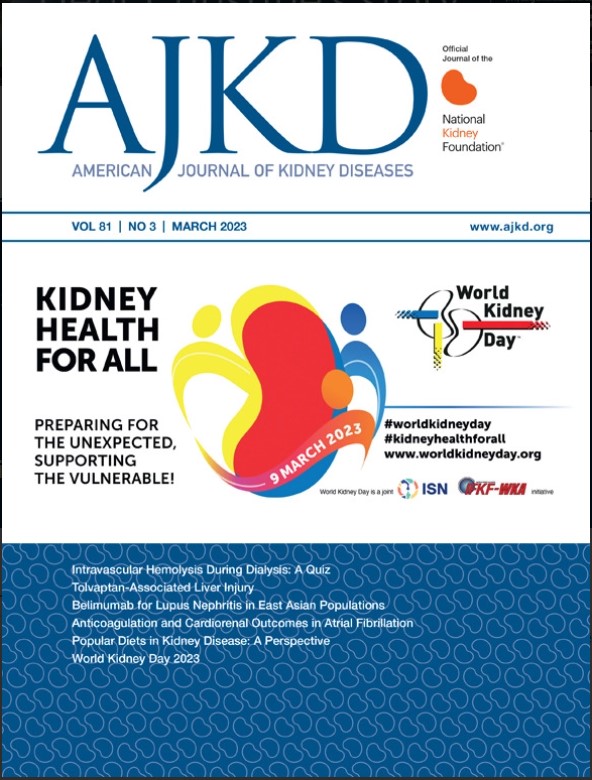Intronic and Coding Genetic Variants in Autosomal Recessive Polycystic Kidney Disease Among Israeli Bedouins of Arabian Peninsula Ancestry.
IF 8.2
1区 医学
Q1 UROLOGY & NEPHROLOGY
引用次数: 0
Abstract
RATIONALE & OBJECTIVE Autosomal recessive polycystic kidney disease (ARPKD) is typically caused by biallelic PKHD1 mutations. However, some clinically diagnosed patients remain without a molecular diagnosis. We aimed to identify cryptic pathogenic variants in Israeli Bedouin patients of Arabian Peninsula ancestry with ARPKD. STUDY DESIGN Case series. SETTING &PARTICIPANTS Twelve Bedouin patients of five unrelated families of Arabian Peninsula ancestry with ARPKD whose causative mutation was unknown despite standard genetic analyses. OBSERVATIONS Whole-genome sequencing (WGS), including short- and long-read platforms, followed by bioinformatics filtration and transcript analysis, identified a pathogenic PKHD1 variant confirmed by functional analysis: a deep-intronic PKHD1 variant (6:51,757,883 C>T (hg38), ENST00000340994.4: c.8643-2945 G>A) was identified in 12 patients with ARPKD within 5 families of Israeli Negev Bedouins originating from the Arabian Peninsula. Variant segregation within affected kindreds was consistent with autosomal recessive inheritance. cDNA analysis of urine-derived tubular kidney epithelial cells confirmed aberrant splicing with pseudo-exon inclusion of 121 bp, introducing a premature stop codon. This variant was found in 2 of 100 ethnically matched Bedouin controls (carrier rate 1:50). Among all known PKHD1 splicing-disrupting variants, this mutation received the lowest and most benign scores across splicing prediction tools. We also delineate 12 other PKHD1 variants in Negev Bedouins. LIMITATIONS Functional studies were limited to urinary-derived epithelial cells, small cohort size. CONCLUSIONS We describe a deep-intronic truncating PKHD1 variant, as a common founder mutation causing ARPKD in Israeli Bedouins of Arabian Peninsula ancestry. This PKHD1 mutation caused pseudo-exon inclusion through a donor-gain mechanism, without directly introducing a splice site. These findings highlight the diagnostic utility of WGS and transcript analysis in identifying pathogenic non-coding ARPKD variants.阿拉伯半岛血统的以色列贝都因人常染色体隐性多囊肾病的内含子和编码遗传变异。
理由与目的常染色体隐性多囊肾病(ARPKD)通常由双等位基因PKHD1突变引起。然而,一些临床诊断的患者仍然没有分子诊断。我们的目的是鉴定阿拉伯半岛血统的以色列贝都因人ARPKD的隐性致病变异。研究设计案例系列。背景与参与者:来自阿拉伯半岛5个不相关家族的12名be都因人ARPKD患者,其致病突变尽管标准基因分析仍未知。全基因组测序(WGS),包括短读和长读平台,随后进行生物信息学过滤和转录本分析,鉴定出一种致病性PKHD1变异,并通过功能分析证实:在来自阿拉伯半岛的以色列内盖夫贝都因人5个家族的12例ARPKD患者中鉴定出一种深内含子PKHD1变异(6:5 55,757,883 C b> T (hg38), ENST00000340994.4: C .8643-2945 G> a)。病种内的变异分离与常染色体隐性遗传一致。尿源性肾小管上皮细胞的cDNA分析证实了异常剪接,包含121 bp的伪外显子,引入了一个过早停止密码子。该变异在100个种族匹配的贝都因对照中发现2个(携带率1:50)。在所有已知的PKHD1剪接破坏变异中,该突变在剪接预测工具中获得最低和最良性的评分。我们还在内盖夫贝都因人中发现了12种PKHD1变体。局限性:功能研究仅限于尿源性上皮细胞,队列规模较小。结论:我们描述了一个深内含子截断的PKHD1变异,它是导致阿拉伯半岛血统的以色列贝都因人ARPKD的共同始祖突变。这种PKHD1突变通过供体-获得机制导致假外显子包含,而不直接引入剪接位点。这些发现强调了WGS和转录本分析在鉴定致病性非编码ARPKD变异中的诊断作用。
本文章由计算机程序翻译,如有差异,请以英文原文为准。
求助全文
约1分钟内获得全文
求助全文
来源期刊

American Journal of Kidney Diseases
医学-泌尿学与肾脏学
CiteScore
20.40
自引率
2.30%
发文量
732
审稿时长
3-8 weeks
期刊介绍:
The American Journal of Kidney Diseases (AJKD), the National Kidney Foundation's official journal, is globally recognized for its leadership in clinical nephrology content. Monthly, AJKD publishes original investigations on kidney diseases, hypertension, dialysis therapies, and kidney transplantation. Rigorous peer-review, statistical scrutiny, and a structured format characterize the publication process. Each issue includes case reports unveiling new diseases and potential therapeutic strategies.
 求助内容:
求助内容: 应助结果提醒方式:
应助结果提醒方式:


